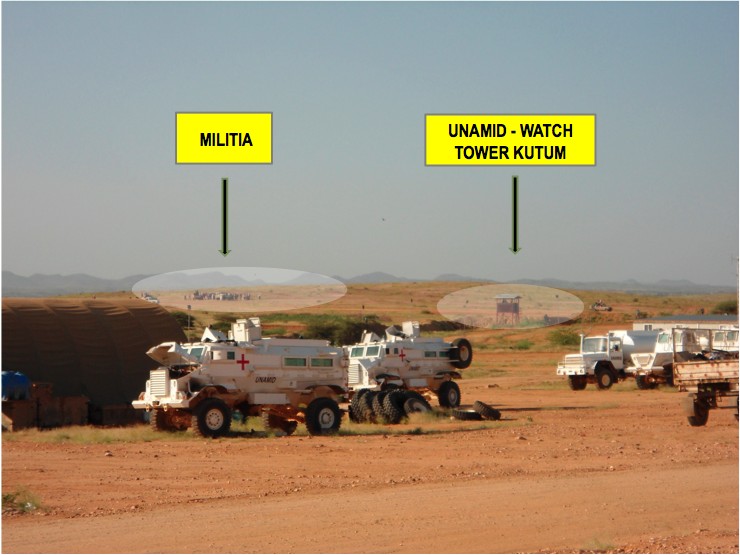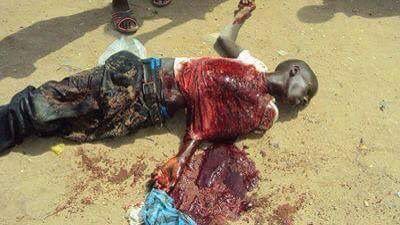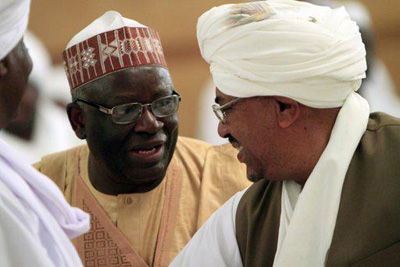The Failure of the UN/African Union Mission in Darfur: A Summary of Recent Assessments
Eric Reeves | May 16, 2018 | https://wp.me/p45rOG-2fj
Almost inconceivably, the failures of the UN/African Union Mission in Darfur (UNAMID) continue to grow, failures that have cost countless thousands of lives and seen (during its ten-year tenure) the new displacement of more than 1.5 million people, many for the second, third, even fourth time. In other words, of the almost 3 million Darfuris displaced in Darfur and eastern Chad, more than half have been displaced since UNAMID officially deployed in 2008. These failures often have names and have been analyzed in detail, either by human rights organizations or—when there was an international news presence in Darfur—by intrepid journalists. The mass rape of more than 200 girls and women at Tabit, North Darfur (October 2014) was definitively reported by Human Rights Watch in February 2015—this after UNAMID investigators failed utterly to establish what was reported at the time by Radio Dabanga. Reuters reported on disgraceful inaction by UNAMID when the village of Tabarat, North Darfur, was the scene of a terrible slaughter in 2010:
• Exclusive: Darfur attack survivors tell of brutal killings | Reuters (Opheera McDoom) | KHARTOUM | Fri Sep 17, 2010
Darfuri men were shot dead at point blank range during a surprise Arab militia raid on a busy market this month in which at least 39 people were killed and almost 50 injured, eyewitnesses said on Friday. The attack on civilians was reminiscent of the early years of the counter-insurgency operation in Sudan’s west, which took up arms against the government in 2003, complaining that the region had been neglected by Khartoum The International Criminal Court in The Hague has since issued an arrest warrant for Sudanese President Omar Hassan al-Bashir for genocide and war crimes in Darfur, charges he denies.
Details of the September 2 attack on the market in the village of Tabarat have not previously come to light. The government prevented peacekeepers from visiting the site until days later. But five survivors of the attack told Reuters that heavily armed Arab militia had targeted male victims and shot many at point blank range.
In Tabarat, men were rounded up by militia wearing military uniforms who rode into the market on horses and camels pretending to be buying goods before spraying the shops with gunfire. Then vehicles mounted with machine guns and carrying militia fighters appeared and rounded up some of the men, survivors said.
“They laid them down and they came up close and shot them in their heads,” Abakr Abdelkarim, 45, told Reuters by telephone from the town of Tawilla, where many of the victims had sought refuge and medical help. “(Those killed) were all men and one woman—some men were tied with rope behind the cars and dragged until they died.”
[Nominally, UNAMID has complete access to all areas of Darfur without permission of the Khartoum regime, per the January 2010 “Status of Forces Agreement” (SOFA). UNAMID’s consistent failure to assert this agreement when denied access has never been made a true issue before the UN Security Council, which initially (and subsequently) authorized UNAMID—ER]
UNAMID never issued a report on the Tabarat massacre (for a fuller account, see “What We Learn of UNAMID from the September 2010 Tabarat Massacre,” September 18, 2011 | http://wp.me/p45rOG-Gi/).
An inert UNAMID watches as militia forces assault civilians (Kutum, North Darfur)
Nor has UNAMID protected defenseless civilians in camps for displaced persons. UNAMID intelligence preceding such attacks has been very poor, indicating a fundamental failure in communicating with those at risk in Darfur. The repeated assaults on Kalma camp (near Nyala, South Darfur) are a perfect illustration. Even when attacks are clearly well-organized, UNAMID is unwilling and/or unable to act as a protective force. Kalma is only the most egregious example, but attacks in 2017 and 2008 are exemplary nonetheless (from Human Rights Watch, September 22, 2017 | https://www.hrw.org/news/2017/09/22/bashir-visit-highlights-abuses-darfur/):
Sudan’s security forces opened fire today on protesters in South Darfur’s largest camp for displaced people, killing at least 5 and wounding more than 20. The residents were protesting, for the third consecutive day, a planned visit by President Omar al-Bashir. They flooded the streets of the camp and chanted slogans, holding signs saying al-Bashir should not set foot in Kalma camp and instead be sent to the International Criminal Court (ICC) where he faces charges for war crimes, crimes against humanity, and genocide.
The Sudanese government’s use of force in response was, according to witnesses, grossly disproportionate. Security forces, including the notorious Rapid Support Forces responsible for war crimes in Darfur, deployed around the camp and fired live ammunition at protesters to disperse them. This is not the first time Sudanese forces have opened fire on residents of Kalma. In 2008, on the pretext of disarming the camp, government forces shot indiscriminately at residents, killing at least 31.
[See also | The Very Image of UNAMID Impotence and Dereliction of Duty: El Salam camp for displaced persons brutally assaulted by Khartoum’s forces | Eric Reeves, August 5, 2014 | http://wp.me/s45rOG-5316/
and
Assaults on Camps for the Displaced in Darfur: History Makes Clear They Will Increase | Eric Reeves, August 27, 2017 | http://wp.me/p45rOG-25W/]
I have chronicled for the past ten years UNAMID’s failures in Darfur, its serially incompetent and dishonest leaders, and the gross deficiencies in its reporting, particularly of sexual violence. And that chronicle extends to the present: this week Radio Dabanga reports on both the sharp criticism from Human Rights Watch concerning UNAMID’s inability to assess the violence in the Jebel Marra area, and renewed violence and displacement further south in “East Jebel Marra” in South Darfur State:
• Human Rights Watch: UNAMID absent as attacks surge villages in Darfur’s Jebel Marra | Radio Dabanga, May 13, 2018 | DABANGA SUDAN
In response to the latest report of the UN Secretary-General on the joint African Union-United Nations mission in Darfur (UNAMID), Human Rights Watch (HRW) urges the peacekeepers “to deepen and strengthen – not abandon– its human rights and protection role.”
On Thursday, the head of UNAMID, Jeremiah Mamabolo, briefed the UN Security Council (UNSC) on the current situation in Darfur. “The general security situation in Darfur remains calm, except for sporadic clashes between the Sudan Liberation Army of Mr. Abdul Wahid [Abdelwahid El Nur], government forces and nomads in Jebel Marra,” Mamabolo stated. “It is imperative that concerted efforts be exerted towards mobilisation of financial resources to consolidate and sustain the prevailing peace and stability in the region,” he said.
Jehanne Henry, team leader of the HRW Africa Division however said in a comment on Thursday that “there’s a real risk the dire protection needs of civilians will be ignored or forgotten” – with “such a gloss-over assessment from peacekeepers.” Pointing to the latest report of the UN Secretary-General on UNAMID that called the situation in Darfur “generally stable” with some “low scale skirmishes”, Henry mentioned the recent torching of a number of villages by “the notoriously abusive Rapid Support Forces” (RSF), Sudan’s main militia, the “killing at least 23 civilians and displacement of about 15,000 people into the mountains.”
According to the HRW team leader, the “UN-AU peacekeepers and other international actors do not know the full scale of the death toll and destruction being wrought on civilians in Jebel Marra – or across Darfur – because they are largely absent.
[Indeed, UNAMID only began construction of the long-planned “Temporary Operating Base” in Golo (Jebel Marra) in March and the staffing of peacekeeping personal is skeletal. UNAMID simply can’t monitor developments in Jebel Marra or “East Jebel Marra,” especially as it extends into South Darfur—ER]
“Sudan has restricted access and the peacekeeping mission has been under pressure to quickly downsize. While Jebel Marra was recognised as a trouble area over a year ago, construction on the temporary operating base for UNAMID is only just beginning and peacekeepers still face access problems.”
HRW emphasised that areas without peacekeepers heighten the risk that civilians will be unprotected from government violence and abuses. “The mission’s reporting confirms that widespread rights violations, including sexual violence, are committed across Darfur with impunity.” The human rights watchdog further warned for the consequences of the decision by the UNSC last year to reduce the peacekeeping mission with one third. “As it downsizes, UNAMID needs to become agile enough to respond quickly to violence across a vast area and to deepen and strengthen – not abandon– its human rights and protection role, which brought it to Darfur in the first place.”
[The chances of this happening—especially as UNAMID faces further reductions in the UN Security Council vote next month on re-authorizing the Mission—are non-existent, based on past international contentment with the performance of the UN/AU peacekeepers and the terrible leadership that has plagued UNAMID from its earliest days—ER]
The grim truth is that UNAMID—despite ten years in Darfur, and a designated base in Golo, Jebel Marra—is simply unable to investigate current violence. It lacks access because it lacks the will to demand that the 2008 Status of Forces Agreement be respected by Khartoum’s various military and militia forces:
• Thousands newly displaced by Jebel Marra fighting | Radio Dabanga, May 15, 2018 | KASS
Thousands of civilians have reportedly been newly displaced from villages in southern Jebel Marra as fighting broke out between government forces, allied militias and armed rebels in the area of Kass on Friday [May 11, 2018]. Witnesses told Radio Dabanga that the fighting in the Jebel Marra mountains in South Darfur has pushed “thousands of civilians to flee to Kara, Kabu, Kor, Saboun El Fagur, Girlanjabang, Waglem, Karoo, Wrangla and Daruna.”
[This is precisely the violence that UNAMID is not seeing or reporting. There is terrible leadership of the Mission, and peacekeepers and their officers are increasingly risk-averse. That the Mission has been unable to build and staff its “Temporary Operating Base” in Golo (Jebel Marra) reflects both on Mission leadership and a feckless international community—ER]
Unprotected victim of the Nierteti massacre, January 1, 2017
Their numbers add to the reported 11,500 displaced people who have fled from the fighting in northern Jebel Marra at the end of April. According to the UN Office for the Coordination of Humanitarian Affairs (OCHA) at least 2,280 newly displaced households (about 11,500 people) arrived in Rokoro town and nearby Jemeiza village after 18 April.
People in Kass have described the situation to Radio Dabanga as “very difficult.” They recounted that the Sudanese army had mobilised more than 1,500 troops and Rapid Support Forces [RSF], backed by other troops that arrived from Zalingei in an attempt to launch new attacks on the holdout armed Sudan Liberation Movement led by Abdelwahid El Nur (SLM-AW) in Jebel Marra.
People fleeing from Gobo village told Radio Dabanga last week that two people were killed and four others were wounded in the clashes in southern Jebel Marra on Friday. People from neighbouring Sina village said that they heard shooting and explosions until Friday afternoon. Smoke was seen billowing above the areas of Tara, Tarantara, and Kalokitting… This year in March, government forces, consisting mainly of RSF troops, attacked rebel sites in East Jebel Marra. The next month, areas in north-western Jebel Marra were targeted. At least 13 villages burned to the ground. Tens of thousands of people fled their homes.
Today, Sudan’s minister of defence is expected to appear before parliament to respond to the issue. Member of Parliament Siham Hassan Hasaballah requested his comments on the violent events in Rokoro, Deribat, Nierteti and Tur. Hasaballah has been known to represent the SLM-AW.
At the end of a three-day mission to Sudan, United Nations humanitarian chief Mark Lowcock has made several urgent requests to Sudan and the international community, including to allow access to conflict-ridden areas for humanitarian organisations. In a statement to the press on Monday, Under-Secretary-General Lowcock said that “skirmishes in recent weeks between armed groups in pockets of Darfur’s Jebel Marra region have caused a renewed wave of internal displacement.” He urged all parties to the conflict in Sudan to allow the humanitarian community to bring assistance to people in need.
[“Skirmishes in recent weeks between armed groups in pockets of Darfur’s Jebel Marra region”: this hardly describes the violence reported by Radio Dabanga on the basis of numerous eyewitnesses and first-hand account. And “urging all parties to the conflict in Sudan to allow the humanitarian community to bring assistance to people in need” disingenuously suggests that the SLA-AW is responsible for now “allowing” humanitarian access. Fighting may make access difficult or impossible—but only Khartoum actually deliberately obstructs humanitarian relief efforts—ER]
Holding UNAMID Accountable: A Two-Part Bibliography
Given the refusal by any but human rights organizations to hold UNAMID accountable—and the Mission is now one of the longest and most costly operations in UN peacekeeping history—I offer here a “bibliographic guide” to UNAMID’s ghastly failures. UNAMID’s consistent pattern of mendacity, misrepresentation, and self-congratulatory pronouncements demands that we have a record that is not fashioned by those in whose interest it is to celebrate UNAMID, including UNAMID leaders present and past. This August 2009 dispatch from Reuters should be all we need to see that this is the case:
Two departing leaders of the current UN/African Union peacekeeping mission in Darfur (UNAMID) claim that the war is indeed over, and has devolved into a “low-intensity” security problem. General Martin Agwai, the Nigerian force commander, declared on stepping down that, “as of today, I would not say there is a war going on in Darfur,” but rather “very low intensity” engagements. “What you have is security issues more now. (Reuters August 27, 2009 | https://uk.reuters.com/article/uk-sudan-darfur/sudans-darfur-no-longer-at-war-peacekeeping-chief-idUKTRE57Q14R20090827/)
Subsequent history in Darfur makes grotesque nonsense of these utterly unjustified claims—especially when we consider the brutal campaigns in North Darfur and Jebel Marra (2013 – 2016)—although they are apparently taken at face value by the African Union Peace and Security Council, which at a 2013 meeting declared that UNAMID was “worthy of emulation” in future African peacekeeping missions.
Former UNAMID head Ibrahim Gambari chatting with indicted génocidaire Omar al-Bashir at the wedding of the daughter of Janjaweed leader Musa Hilal (January 2012). On retiring (September 2012) Gambari declared: “I am gratified to note that barely 31 months on, all the set goals and objectives have largely been met.” We might ask just what those “goals: were…
This bibliography is in two parts: the first, here, consists of recent overviews detailing UNAMID’s gross reporting inadequacies and its inability to halt violence wherever it suits Khartoum to initiate attacks, including village destruction, raiding of markets, and assaults on camps for displaced persons. The terminus a quo is September 2017.
A second part will include a more extensive bibliography, covering the past ten years of UNAMID failures and what has occurred on its watch in the way of mortality, rapes, displacement, and a decline in humanitarian access.
Part 1: Recent overviews of UNAMID:
• Massive Violence in the Greater Jebel Marra Area Elicits No Response from UNAMID | Eric Reeves, May 1, 2018 | https://wp.me/p45rOG-2eZ
• Recent Violence in Darfur Shows Just How Insecure the Region Remains | Eric Reeves, April 12, 2018 | https://wp.me/s45rOG-8591
• Report on UNAMID in Darfur by Secretary-General António Guterres: More Misrepresentations than Truth | Eric Reeves, March 9, 2018 | https://wp.me/p45rOG-2e1
• UN and African Union Complicity in Obscuring Darfur’s Realities: A long and disgraceful pattern of behavior | Eric Reeves, February 21, 2018 | https://wp.me/p45rOG-2dO
• African Union Complicity in the Darfur Genocide | Eric Reeves, February 20, 2018 | https://wp.me/p45rOG-2dJ
[A Five-Part Series Looking at a Critical Moment in Recent UNAMID failures in Darfur]
• As UNAMID deploys out of Darfur: ethnically-targeted violence continues on a wide scale | A bi-weekly compendium, No. 5 | Eric Reeves, December 4, 2017 | http://wp.me/p45rOG-29s
• As UNAMID deploys out of Darfur: ethnically-targeted violence continues on a wide scale | A bi-weekly compendium, No. 4 | Eric Reeves, November 18, 2017 | http://wp.me/p45rOG-28a
• As UNAMID deploys out of Darfur: ethnically-targeted violence continues on a wide scale | A bi-weekly compendium, No. 3 | Eric Reeves, November 3, 2017 | http://wp.me/s45rOG-8177
• As UNAMID deploys out of Darfur: ethnically-targeted violence continues on a wide scale | A weekly compendium, No. 2 | Eric Reeves, October 21, 2017 | http://wp.me/p45rOG-27p
• As UNAMID deploys out of Darfur: ethnically-targeted violence continues on a wide scale | A weekly compendium, No. 1 | Eric Reeves, October 14, 2017 | http://wp.me/p45rOG-27b


